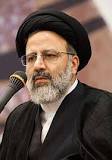WASHINGTON, D.C. (ANS) — Hardline cleric Ebrahim Raisi was sworn into office as the new Judiciary Chief of Iran’s Islamic Republic, according to International Christian Concern (ICC) on March 8, 2019.

His long anticipated appointment comes with a five-year term, which is approved by Iran’s Supreme Leader Ayatollah Ali Khamenei. Raisi’s career trajectory comes at the expense of a long line of serious human rights abuses that have provoked great alarm regarding his new position.
International Christia Concern said Raisi is a hardline Islamic religious cleric who studied at Qom Seminary and quickly rose through the ranks of Iran’s judiciary. His name first rose to prominence in 1988, when Raisi served on Iran’s notorious death commission which massacred thousands of political prisoners declared to be “apostates of Islam.” He would later serve as a prosecutor, deputy chief justice, and attorney general. He would launch an unsuccessful bid for president in 2017, after which momentum began to build for his current appointment.
Raisi has remained unapologetic for his record of serious human rights abuses. In a 2018 speech, he highlighted his involvement in the 1988 mass killings and said it “was one of the proud achievements of the system.” This is a reflection of the regime’s position that the judiciary exists to safeguard Iran’s Islamist ideology. It is for this reason that many of Iran’s Christians are tried for political crimes and viewed as apostates.
“The human rights violation of religious minorities in Iran would most likely get worse under the leadership of Mr. Ebrahim Raisi as Iran’s new judiciary chief,” worries Mike Ansari from Heart4Iran, an Iranian Christian partnership platform.
His judiciary appointment comes at a time when the regime is under significant pressure from its citizenry, who are increasingly discontent with the government’s hardline view of Islam. One Iranian woman shared with ICC, “I am a Muslim, but I don’t like the way that the government is forcing us to do it.”
This enforced Islamist pressure on Iran’s citizens has caused an organic interest in Christianity, which the regime views as a national security threat. “As Christianity is growing fast in Iran, the top religious leaders are alarmed… Their strategy is to arrest a few, but publicize their arrest to put fear in the hearts of 1-3 million Christians and make them isolated, fearful, and prisoners in their homes,” explained Dr. Hormoz Shariat of Iran Alive Ministries.
For this reason, Christian persecution in Iran has grown significantly in recent years. Iran is rated as a Tier 1 Country of Particular Concern by the United States Commission on International Religious Freedom and number 9 on Open Doors’ World Watch List.
Claire Evans, ICC’s Regional Manager for the Middle East, said, “Although human rights violations have long been the norm in Iran, today’s appointment of Raisi as Judiciary Chief marks the beginning of a worrisome new chapter. Raisi has not only been complicit in violent abuses, he has reveled in them. His new position gives him broad powers to ‘protect’ Iran’s Islamic theocracy, a cause of great concern for all Christians, many of whom converted from Islam. We must keep them, and Iran’s judges, in our prayers.”






